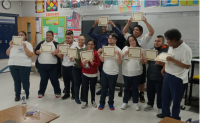Building TIES at the Library
Prince George's County Memorial Library System
Innovation Synopsis
Students with significant cognitive disabilities often have limited opportunities to engage with their communities or develop real-world job skills. The Prince George’s County Memorial Library System (PGCMLS) partnered with the local school system to place Community Referenced Instruction (CRI) students in three library branches, two days a week. Through hands-on tasks, volunteer service, and guided mentorship, students gained job readiness, confidence, and familiarity with library resources, while contributing meaningfully to their local community.
Challenge/Opportunity
Access to meaningful work-based learning: Community Referenced Instruction (CRI) students (teens) with significant cognitive disabilities lacked equitable access to real-world job training and community participation opportunities.
Service gap in youth inclusion: PGCMLS had strong programs for younger children and adults with disabilities but no continuum of engagement for cognitively disabled teens preparing for independence.
Workforce and life skills inequity: Prince George’s County Public Schools (PGCPS) faced limited community partners willing or equipped to host CRI students, reducing opportunities to build employability, communication, and self-advocacy skills. This limited options to transition these students to adulthood independence.
Systemic underrepresentation: Cognitively disabled youth remained largely invisible in public, civic, and workforce development initiatives — this partnership created a replicable model for inclusion and empowerment in community institutions.
Key Elements of Innovation
Referenced Instruction (CRI) Program at Northwestern High School, PGCMLS welcomed groups of CRI students into three library branches, twice a week. Each group worked alongside an instructional aide and a dedicated library mentor who guided them through real, meaningful library work — from checking in book returns and preparing craft materials to helping with programs and maintaining community spaces.
Over the school year, students learned to clock in, follow schedules, work independently, and confidently navigate the library as both users and ambassadors.
This collaboration filled a critical gap in inclusive teen engagement, transforming public libraries into living classrooms where cognitively disabled youth gain independence, purpose, and a sense of belonging — an innovative model for equitable workforce development in libraries.
Achieved Outcomes
Program growth: Pilot fully executed; new cohort of CRI students placed at all three branches.
Skill-building: Students “graduated” with job skills, a year of volunteer experience, and concrete resume references.
Recognition: Included in-branch volunteer celebrations and parents framed certificates — a rare acknowledgment for youth who seldom receive awards.
Community connection: Graduates return with families to showcase library skills and independence.
Partnerships: Strengthened collaboration with PGCPS CRI program; created a replicable model for inclusive teen engagement.
Feedback: Staff, parents, and CRI coordinator highlight increased confidence, empowerment, and belonging, demonstrating meaningful impact on students and the community.

